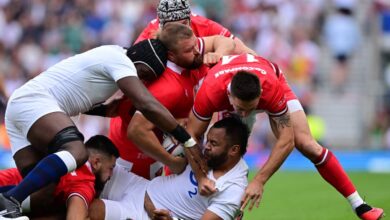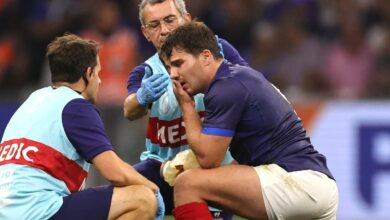England meet familiar foes Australia in pursuit of revitalising summer Down Under

There is every chance that this summer is to be the last swansong for the July tour. World Cup preparations will guide next year’s schedule and it is likely that a Nations Championship and cross-border itineraries will be in place from 2024 onwards. However commercially appealing whatever comes next may be, it will be a shame to lose these slower-burn affairs, steeped as they are in narrative and tradition as foes familiarise themselves with one another.
Certainly the three-date entanglement between Australia and England is a reminder of all that is good about these extended encounters, a collision of two imperfect sides balancing old and new. While a head coach would typically be granted three chances to look at a touring party during the four years between World Cups, the wretched recent period means that, for most, this is the only tour of this style during a disrupted cycle – lending an extra dose of importance.
Eddie Jones’ England departed last week outwardly optimistic, with the vibes good in camp but in recognition of a need for on-field improvement, Six Nations’ struggles followed latterly by an afternoon to forget against the Barbarians. The England head coach may just enjoy time away from the domestic glare and a visit to familiar stomping grounds for the first time since 2016. Jones is yet to lose to Australia with England, and for obvious reason appears to particularly relish these encounters.
Though his pre-match pseudo-psychology can wear, the winning run certainly shows his rather developed understanding of what makes an Australian side tick. That may make the Wallabies his ideal opponents as he attempts to lift England out of their rut. The RFU have publicly and privately given strong backing to their head coach, citing the strength of his record against Southern Hemisphere foes, which must thus be maintained.
“You can learn so much about your players and your squad on these tours, and we’ve missed that,” Jones explained before his side departed for Australia.
“It is completely different conditions: really hard, flat tracks, abusive crowds. The media are going to be in our face. It is a really aggressive environment. We’ve got to go after them.”
Jonny May’s positive Covid test on arrival in Western Australia was not a promising omen of a transformative English tour, but what appears a well-balanced first fifteen has fallen into place quite naturally even in the absence of perhaps a dozen likely tourists. Jones wrote in his autobiography that to beat Australia you must “bully the bully”, and it appears a side picked with that in mind, redolent of the 2016 series-sweep vintage.
Billy Vunipola is back and an immediate starter tasked with delivering front-foot ball; Joe Cokanasiga is given similar brief on the wing. Danny Care may not provide quite the same burly go-forward but his speed of ball may be just as important as Jones seeks an aggressive attack, while among the substitutes lurk young figures of intrigue as back replacements Jack van Poortvliet, Guy Porter and Henry Arundell await debuts.
There is a change of permanent captain, with a fit-again Owen Farrell over-looked for Courtney Lawes’ more laid-back style. For as much as Farrell was left “very unhappy” by the decision to take the captaincy away, it may free the Saracens playmaker up and enable him to focus on developing a partnership with Marcus Smith that must surely fire if England are again to convert their coaches’ words into action.
It is the only the second time that Smith and Farrell have started together, with their first showing a performance of fits and starts as England played with their puzzle pieces in the win over the Wallabies last October. Dave Rennie’s side looked travel-weary on a largely unmemorable evening after several months of high intensity international rugby.
They will be in better fettle for these three encounters, buoyed by improvement from their Super Rugby Pacific sides. The gristle of the team is provided by the Brumbies, who have particularly come on this year, while the three permitted overseas selections (Samu Kerevi, Quade Cooper, Marika Koroibete) stud the backline with quality. Rennie’s two chosen debutants are 33 (lock Cadeyrn Neville) and 29 (hooker Dave Porecki) as he seeks to fortify a seemingly vulnerable tight five and complement a side imbued with young talent over the last couple of years in Rennie’s quiet, but promising, evolution.
This is a golden sporting decade in Australia, and one rugby must seize. The battle for eyes is ever-fierce in a crowded sporting market, and, unlike Nadine Dorries, the Australian public is rarely confused about which it wishes to focus on. There is optimism that rugby may again occupy plum place in the Australian almanac, and a win over their old foes – little unites the country like victory over England – could be a real fillip to kick-start an exciting ten years.
The 3-0 series defeat last time still stings, and there will be delight if they are to end Jones’ unbeaten run against his old employers. But, excitingly, any series scoreline is eminently imaginable – England and Australia may just send the summer tour off with a series to savour.
The manner of midweek defeat to the Maori All Blacks will have dented Ireland’s otherwise well-placed confidence as they bid for history in New Zealand. Little went right for the second-string Ireland team, with few fringe candidates pushing their case for increased involvement, and a number of injuries will be causing Andy Farrell the sort of headaches he could rather do without.
Still, there is a feeling that New Zealand may not have the same air of invincibility that usually accompanies the All Blacks at Eden Park, where they have not lost in 28 years. Not only have Ian Foster and his coaching staff been struck down by Covid, but there are seemingly doubts about the direction of the team under Foster, who is yet to truly settle on how best to utilise the still-unrivalled playing resources at his disposal. With Ireland’s well-oiled machines largely back in operation, hopes have never been higher for an ending of their New Zealand duck.
England Captain’s Run at Optus Stadium
The business for Wales is hardly straightforward, either. In their first fixture since their Italian home humbling it is in to the thinner air of Pretoria that Wayne Pivac’s side will next run out, confronting a fully-loaded Springbok side with the prospect of a capacity home crowd for the first time in a long while. Any defeat to Italy will increase the focus on a head coach but the thought is that Pivac could be in particular peril if this tour also goes swiftly south.
But to rule out Wales entirely would be hasty. They showed in running France close in Cardiff defeat that they can withstand physical rigours, and under Pivac they have had a habit of following deep troughs with their more promising peaks. South Africa’s fearsome pack may yet be able to exert their apparent authority, but with debutant Tommy Reffell’s fetching acumen and a clutch of strike-running backs ready to strike, Wales are well-equipped to pounce if South Africa are slow into their groove.
Jamie George and Jack Nowell play lawn bowls in Perth
Ireland captain’s run at Eden Park in Auckland





